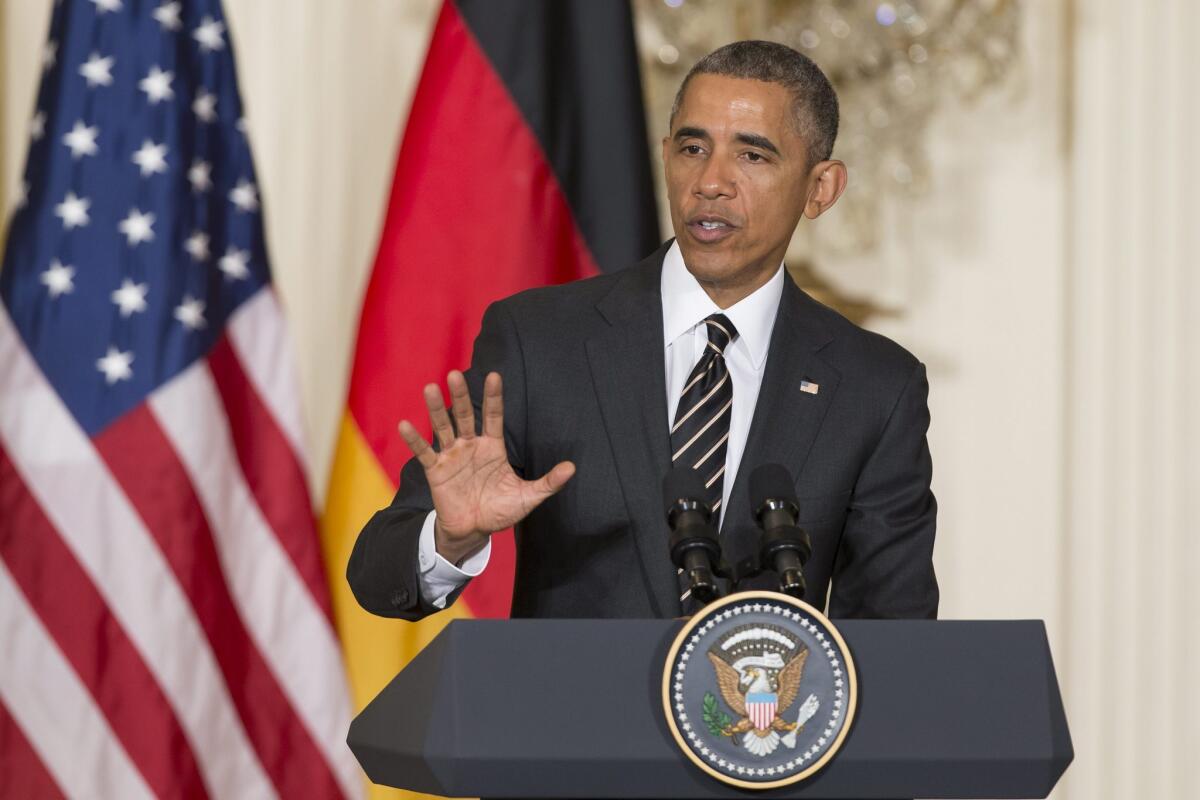Column: Obama’s sadder but wiser foreign policy

When he entered the White House in 2009, Barack Obama had grand ambitions in foreign policy. He planned to withdraw U.S. troops from Iraq and Afghanistan, build a better relationship with Russia, broker peace between Israel and the Palestinians and offer a hand of friendship to Iran and the Muslim world.
Six years later, the president, and the rest of us, are sadder but wiser. American troops are still in Afghanistan and back in Iraq, although in much smaller numbers and not in ground combat. The “reset” with Russia and prospects for peace in the Middle East are little more than wistful memories.
So when the White House published the second-term edition of its national security strategy last week, one of its goals was simply to catch up with those new realities, and to reassert that the United States has no choice but to stay engaged.
“The question is never whether America should lead, but how we lead,” the president wrote in his preface to the 29-page manifesto.
There’s a lot of leadership in the pages that follow — a series of rebuttals, in effect, to Republican critics who charge that Obama isn’t leading and doesn’t want to.
“We will lead with purpose,” the document says. “We will lead with strength.... We will lead by example.”
We will lead every way we can, it seems, except one: We won’t lead from behind. (That phrase, used accurately but incautiously by a White House aide during the U.S.-led war in Libya, has long since been retired.)
And it’s true that the Obama administration has been leading: in the war against Islamic State in Iraq and Syria, in the nuclear negotiations with Iran, and (with Germany and France) in the campaign to stop Russia from conquering more of Ukraine.
That’s why it was interesting that Obama himself, in a long interview the online magazine Vox published this week, chose to emphasize a different theme: not leadership, but lower expectations.
Yes, he said, the U.S. will still be “the indispensable nation for the rest of this century, just like it was for the last one.” But the president’s main point was that even a superpower with strong allies can sometimes make only a modest difference in an increasingly disorderly world.
“You take the victories where you can. You make things a little bit better rather than a little bit worse,” Obama said. “And that’s in no way a concession to this idea that America is withdrawing,” Obama said, “or there’s not much we can do. It’s just a realistic assessment of how the world works.”
Take the Middle East. “I came in with some very clear theories about what my goals were going to be,” Obama said. “And then the Arab Spring happened.” Now, he said, he’d be glad just to see some “movement toward greater stability.”
Obama’s national security advisor, Susan Rice, echoed the theme, calling for “strategic patience.” That’s another way of describing the limits of U.S. power, a warning that problems like Islamic extremism will take a generation to abate.
“Too often what’s missing here in Washington is a sense of perspective,” said Rice.
“While the dangers we face may be more numerous and varied, they are not of the existential nature we confronted during World War II or the Cold War,” she said.
In other words, things aren’t as bad as they look. So could you please cut us some slack?
She has a point. The terrorists of Islamic State aren’t a direct threat to the United States — so far, at least. Iran’s nuclear program is in effect frozen. Russia is threatening Ukraine, but it’s no longer a global menace.
But for Obama, the main foreign policy lesson is still the one he campaigned on in 2008: U.S. power should be used sparingly.
“The real challenge for the country — not just during my presidency but in future presidencies — is recognizing that leading does not always mean occupying … and that American leadership means wherever possible leveraging other countries, other resources,” he told Vox.
Even though his new national security framework includes a daunting list of threats (it ranks climate change and epidemics alongside nuclear proliferation and terrorism) and national interests (including not only democracy but also, for the first time, the human rights of LGBT people), the main point the president wants to make was about the limits on American power.
That will disappoint both conservative and liberal interventionists, who want to see Obama intervene more vigorously in Syria or send weapons to the government of Ukraine. His implicit answer: Still not interested.
The traditional word for that vein of foreign policy thinking is realism: Making sure our goals don’t outstrip our means.
With two years to run, Obama does have a foreign policy strategy — or, at least, a compendium of threats and goals. As he enters the last chapter of his presidency, he and his aides are inevitably thinking ahead to what their legacy will be.
Their message to history’s referees last week was: Lower your expectations.
Twitter: @DoyleMcManus
Follow the Opinion section on Twitter @latimesopinion and Facebook
More to Read
A cure for the common opinion
Get thought-provoking perspectives with our weekly newsletter.
You may occasionally receive promotional content from the Los Angeles Times.











